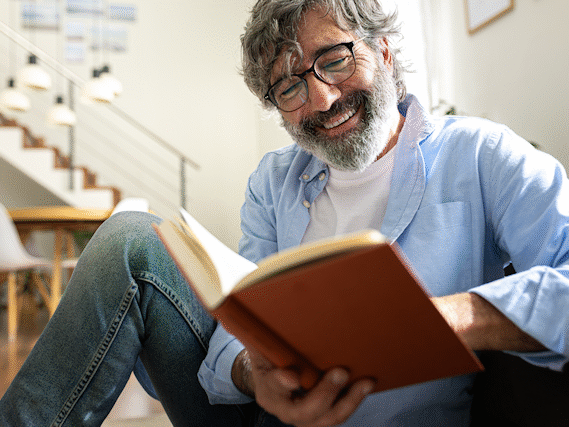This is part 3 in the series of the 6 key facets of wellbeing
Part 1: Connection: The Foundation of Wellbeing
Part 2: Activity: The Second Core Driver of Wellbeing
Opening the Dimension
There’s a moment when a new skill or insight reshapes how you see the world. You notice a car not just as a vehicle, but as a collection of moving parts, interacting systems, and design choices. You solve a problem by seeing patterns you hadn’t before or communicate in a way that suddenly clicks. Learning opens a new dimension of experience, expanding your wellbeing and daily experience in ways that feel both exhilarating and liberating. Curiosity acts as a gentle invitation, encouraging exploration in a space where experimentation is safe, mistakes are welcomed, and discovery delights.
The Science of Learning for Wellbeing
Every step into new knowledge activates subtle but profound changes in the mind and body. Learning strengthens neural networks through neuroplasticity[i] and releases dopamine, making curiosity feel rewarding[ii]. Cognitive engagement that comes from tackling a new skill to experimenting with creative crafts enhances memory, sharpens problem-solving, and reduces stress[iii]. People experience learning differently: some through hands-on practice, others via reflection, social connection, or visually. This mind-body interaction expands how we think, act, and relate, supporting overall wellbeing while opening-up curiosity and flexibility.
Everyday Learning
Learning thrives in everyday moments, quietly reshaping our experience. It’s in the joy of following a new recipe, the wonder of trying a sketching technique, or the small victories of mastering a conversation in a foreign language. Each attempt is a safe exploration: curiosity is welcomed, mistakes are embraced, and progress is noticed and savoured. Adopting a growth mindset shows that skill develops through engagement and effort rather than innate talent[iv] Andy Murray’s career demonstrates that success comes from learning, adapting, and persevering. Feel the thrill of discovery, do the small steps that build skill, and experience how confidence and delight ripple into other areas of life.
The Ripple Effect of Learning
Learning radiates through the mind and body, influencing confidence, behaviour, and relationships. Every skill, from touch typing to a tennis serve develops neural pathways connecting thought, sensation, and movement. Muscle memory, sensory awareness, and deliberate engagement allow effortless action, freeing the mind to explore creativity and problem-solving. These effects expand in all directions, a three-dimensional ball of ripples touching daily life, social connection, and personal wellbeing. Sharing what we’ve learned, be it a recipe, a story, a technique will strengthen relationships and inspire curiosity in others. Small, consistent learning moments accumulate, creating mastery and purpose that enrich the mind, body, and overall sense of wellbeing.
Challenging Automatic Responses
Learning shapes how we respond in the moment, helping us navigate tension, uncertainty, and surprise with awareness. Cognitive dissonance and bias can be triggering, prompting habitual reactions, like a defensive comment, a hasty judgement, a sense of frustration. Yet we can develop the skill to notice and gently redirect them. Feel it: sense tension or discomfort as it arises, noticing body and mind reactions.
Do it: pause, explore a different response, or try a fresh perspective.
Experience it: observe how the shift changes outcomes, how curiosity and openness reshape interactions, and how the ripple extends beyond yourself. Each micro-experiment strengthens capacity to act deliberately, weaving flexibility, skill, and awareness into thought, action, and social connection.
Owning Your Learning
Learning becomes truly yours when it moves into active engagement and application. Like the maths teacher who only began to understood calculus when he started teaching it, we internalise knowledge by using it, experimenting with it, and sharing it. Feel it: notice how new understanding resonates within you.
Do it: apply a concept in a small, real-world context, or explain it to someone else. Experience it: observe how fluency and confidence grow as ideas shift from stored information into knowledge that shapes thinking, behaviour, and decision-making. Ownership transforms learning into a living part of you, amplifying the ripple effect through mind, body, and relationships, while enhancing wellbeing.
Embracing the Learning Journey
Learning is a living, expanding force that transforms mind, body, and relationships. Each new skill or insight stretches brain and body, creating ripples that radiate in all directions — shaping confidence, behaviour, connection, and overall wellbeing. By noticing triggers, experimenting with responses, and taking ownership of discoveries, we become active participants in our own growth. Curiosity, effort, and engagement turn knowledge into something we carry with us, integrating it into how we act, think, and relate. This is the gentle superpower of learning: it liberates, connects, and expands what we believe is possible. As you explore the next facet, Appreciation, take a moment to notice and savour these ripples, and the richness of experience that learning opens up, and the joy of being fully present in it. To begin, pick one small curiosity today, act on it, and experience how it stretches and delights your world.
References
[i] https://www.ncbi.nlm.nih.gov/books/NBK557811/. – Puderbaugh M, Emmady PD. Neuroplasticity. [Updated 2023 May 1]. In: StatPearls [Internet]. Treasure Island (FL): StatPearls Publishing; 2025 Jan-.
[ii] https://www.ncbi.nlm.nih.gov/pmc/articles/PMC8066851. – Speranza L, di Porzio U, Viggiano D, de Donato A, Volpicelli F. Dopamine: The Neuromodulator of Long-Term Synaptic Plasticity, Reward and Movement Control. Cells. 2021 Mar 26;10(4):735. doi: 10.3390/cells10040735. PMID: 33810328; PMCID: PMC8066851.
[iii] https://pmc.ncbi.nlm.nih.gov/articles/PMC10475943/. – Arts engagement and cognitive ageing – Frontiers in Psychology, 2023, systematic review. Fioranelli M, et al. The role of arts engagement in reducing cognitive decline and improving quality of life in healthy older people.
[iv] https://www.ncbi.nlm.nih.gov/pmc/articles/PMC8299535/. – Yeager DS, Dweck CS. What can be learned from growth mindset controversies? Am Psychol. 2020 Dec;75(9):1269-1284. doi: 10.1037/amp0000794. PMID: 33382294; PMCID: PMC8299535.







4 Comments